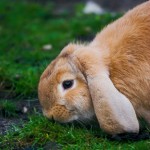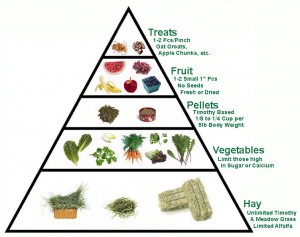
A Balanced Diet
A balanced diet for a rabbit includes protein, starch, carbohydrate, vitamins, and minerals in slower moving digestible material that can be absorbed. It also includes large amounts of fast-moving indigestible organic material.
Hay
Hay is the most important part of a rabbit’s diet and should be fed unlimited. Grasses are a balanced source of vitamins, minerals and indigestible fibers. The fiber keeps their gut moving and the chewing can prevent molar spurs as the chewing helps wear down their teeth and helps maintain a normal dental occlusion. A diet lacking in fibrous materials can cause cheek tooth overgrowth. Diets low in indigestible fiber can lead to gastrointestinal hypomotility (GIS stasis) and trichobezoars (furballs).
There are generally two types of hay – grass hay which has long thing leaves with a central talk, and legume hay such as alfalfa or clover (which are higher in calcium and protein). Alfalfa hay is fine for young rabbits but once they become adults they should be switched over to grass hays like timothy, brome, oat and orchard. It is usually recommended that timothy hay be the primary type fed to an adult rabbit. Talk to your vet for diet information specific to your rabbit.
Hay can be purchased online, bought in pet stores or from a farm or feed store. If buying from a farm or feed store be sure to get horse quality hay and not cow quality. The hay should smell fresh like grass. Often hay can contain mold which is toxic to rabbits, therefore it is recommended that you smell your rabbits hay often! Get used to the smell of fresh hay, so you can spot mold immediately.
Vegetables
Vegetables are also an important part of a rabbits diet. Be sure to wash them carefully to eliminate debris and pesticides. Vegetables are best served wet especially if you have a bunny that doesn’t consume too much water. For a young bunny or a new bunny, vegetables should be introduced very slowly; one at a time over days to watch for loose stool. Not all vegetables are tolerated by all rabbits. 2 cups per 6 pounds of bunny weight is often suggested, which should include 3 or more types of vegetables. Again, talk to your veterinarian for guidelines specific to your rabbit.
Some bunny favorites are parsley, romaine lettuce, dandelion greens, carrot tops, endive, red or green leaf lettuce, basil and dill. Vegetables high in calcium (kale, spinach) should only be fed in very limited quantities and very infrequently. Watch your bunny carefully for the first 12 hours after introducing new vegetables. Signs of gas include loud tummy rumblings, lack of appetite, not wanting to move around, sitting hunched up, pressing stomach into the floor, tooth grinding. Gas can be treated with simethicone. If it continues, or if you are unsure what the problem is, contact your veterinarian ASAP.
Do not feed: Bamboo shoots, beets, cassava, citrus peels, coffee plants, corn, green beans, lima beans, maize, millet, onions, rhubarb leaves, potatoes (white, red or sweet), tea leaves, cabbage, cauliflower, broccoli, cucumber, etc. Dandelions/grass from outside are not safe due to pesticides and the risk of RHDV. If you grow your own veggies outdoors, be mindful of the risk of RHDV.
Pellets
Pellets make up a very small part of the rabbit diet. Look for a pellet which is high in fibre (min. 18%) low in calcium (max. 1%) and low in protein (max.14%). A 5-7 lb rabbit should only be getting 1/4 cup daily. If you have a rabbit that is overweight, and you are cutting back pellets, it is crucial that you cut them back VERY SLOWLY to avoid health complications such as hepatic lipidosis (fatty liver disease).
Timothy based pellets are now available and are good for obese rabbits, less active rabbits or ones prone to sludge and bladder stones. Two great brands include: Martin Mills less active timothy based pellets (www.martinmills.com/littleGeneral.htm) or Oxbow Timothy pellets. Alfalfa pellets are suitable for young rabbits, and may be helpful for aging or thinning rabbits. Talk to your vet about the right type of pellets for your rabbit.
Comparison of Rabbit Dry Foods
Fruit/Treats
Fruits are a favorite food of rabbits but these are treat foods and should be fed sparingly. Too much sugar can cause and overgrowth of bacteria in a rabbits gut and can upset their stomach. We recommend limiting it to 1-2 tablespoons per 5 lb rabbit. Some favorite treats are banana, carrot, strawberries, apple, blueberries watermelon, dried cranberries and papaya. Ensure that any dried fruit is free of oil and sugar. Many dried fruit such as cranberries are coated with sugar and oil. (You can make your own with a food dehydrator).
When looking for a treat, stay away from products with nuts, seeds, corn (all of which are too high in fat and can cause impaction), sugar and dairy (rabbits are vegans!). Many treats found in stores labeled for rabbits are unhealthy and not suited for them. Resist the temptation to feed human snacks such as cereal, cookies, bread etc. and remember that chocolate can be toxic to rabbits.
Many healthy and bunny safe treats can be found at: http://www.store.rabbitrescue.ca/
Calcium
A diet low in calcium will help maintain your rabbit’s health. Excessive dietary calcium may contribute to the development of urolithiasis (stones). A level of 0.6-1.0% is recommended. Calcium can be found in certain types of hay, veggies and pellets, so it is important to choose what you feed your rabbit wisely. Some rabbits can tolerate more calcium then others. If your rabbit’s urine looks white or sludgy, they may have too much calcium in their diet.
Obesity
Domestic rabbits are often overfed by their owners. Obese rabbits have high resting heart rates and are at risk of developing cardiac hypertrophy and hypertension. Hepatic lipidosis can develop very quickly in obese rabbits after even short periods without food. Rabbits that are obese are placed at a higher risk going under anesthetic.
Rabbits that are overweight often have a difficult time grooming themselves, and often cannot reach to consume their caecotrophs which are an important part of maintaining their health (they are a good source of B vitamins). Obesity can worsen arthritis and overweight rabbits are more prone to having sludgy urine or cystitis. Maintaining a healthy weight will also help prevent sore hocks from developing.
When changing a rabbits diet, it is essential that you monitor your bunny to make sure he or she is eating (some will refuse at first if they are not offered their favorite foods). Starvation will very quickly lead to hepatic lipdosis and you must make sure that your rabbit is still eating and going to the bathroom. Make changes very slowly! Exercise is often key in weight loss. Providing your bunny with lots of toys and a large bunny proofed area to roam is essential.






